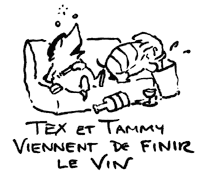Tense / Aspect / Mood / Voice
passé immédiat (venir de+infinitive)
When venir is conjugated in the present and followed by de + infinitive, it means ‘to have just done something.’ This is called the recent past (le passé immédiat).
| Tex et Tammy viennent de regarder une vidéo romantique. Et ils viennent de finir toute une bouteille de vin. Il n’en reste plus une goutte! | Tex et Tammy have just finished watching a romantic video. And they have just finished a whole bottle of wine. There isn’t a drop left! | |
| Tammy: Oh chéri, je t’aime de tout mon coeur. | Tammy: Oh darling, I love you with all my heart. | |
| Tex: Embrasse-moi, mon petit quadrupède! [SMACK!] | Tex: Kiss me, my little quadruped! [SMACK!] |

When venir is conjugated in the imparfait followed by de +infinitive, it means ‘had just done something:’
| Tex et Tammy venaient de s’embrasser quand Bette est arrivée. | Tex and Tammy had just kissed when Bette arrived. | |
| Bette: Oh, excusez-moi … Je vous interromps? | Bette: Oh, excuse me … Am I interrupting you? | |
| Tammy: En effet, nous passons une soirée tranquille … | Tammy: Yes, you are. We are spending a quiet evening … | |
| Tex: Salut Bette, oh, c’est pas grave. On vient de regarder une vidéo. Assieds-toi. | Tex: Hi Bette. Oh, it’s OK. We just saw a video. Sit down. | |
| Tammy: Mais Tex … | Tammy: But Tex … | |
| Bette ronronne. | Bette purrs. |

